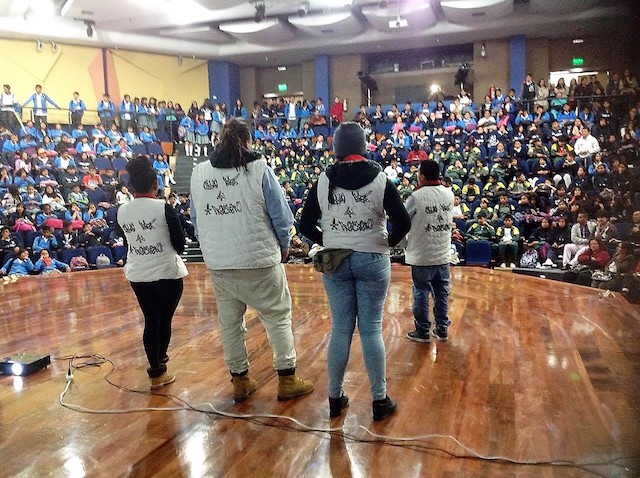Six Years with the Bloods of Ibarra
What follows is in interview with Paul Murtha -- the Director of Mountains of Hope Foundation in Ecuador and Coordinator for Calle Paz y Respeto, the legalized entity for the Ibarra Bloods gang. His six years of work with the Bloods and other gang members has resulted in their well-documented transformation to peace that has become an exemplary model for other development programs seeking to support marginalized youth.
How did this work get started? What is your back story?
In 2012 I was presenting the Peace Education Program in the Ibarra Social Rehabilitation Center (prison). The Director got wind that the local Bloods and Latin Kings gangs were in a state of tenacious detente after two killings. The gangs were confronting the raw certainty that ongoing revenge only made matters outrageously worse and, after years of this, they had had enough! But what then? How to manage this tense hold-off and engage some kind of non-violent approach?
A meeting was arranged where a few gang leaders watched short clips of Prem Rawat's peace message. I think that something clicked here. Perhaps some new perspectives hit home on how to approach the dire situation, some common sense about what is truly important. It was a feeling that, whether or not they recognized what was happening, their angst had been addressed and a kind of relief had been initiated.
How were you able to gain their trust?
During the first meeting, a few gang leaders broke out into a rap song. It sounded great. At the time, I was partner in a recording studio and asked the rappers if they had ever recorded. The next week we were in the studio and the recorded songs were soon the impetus for the Bloods first public initiative, marching in the Ibarra Christmas parade with peace torches, their songs blaring away. So, I was straight up listed as "cool". They accepted this uncommon package of a white-haired gringo.
What were your first attempts to work with them like?
Four leaders, in particular, took to the message of peace and we began to meet every week to review a video clip of Prem and talk openly. It was interesting how the message played on them. I mostly just tried to get out of the way. The unfolding was theirs, at their own pace, according to their own understanding. Slowly, there evolved a sense of direction and an implication of recovered value.
From another person's perspective, our get-togethers would have seemed scattered, impulsive, and borderline outrageous. But the lively exchange actually gave honor to the new level of acceptance they were feeling. It was their way of rolling with it, even testing the boundaries.
I always said that the street youth, coming from years of deceit and treachery, could smell a falsehood four blocks away. That they kept returning and finding ways to make the peace message their own spoke volumes to how deeply they felt touched, to how important and real this feeling of unconditional acceptance was in their lives.
What do the gangs you are working with find compelling about your offer?
In essence, success has come by providing opportunities for the youth to self-express via creative projects. Rather than imposing my ideas on them, I have simply recognized and supported their innate talents and vision.
This practical kind of acceptance was and has been very compelling to them, especially after a long history of being rejected and marginalized. A prime example was the offer from Ecuador's national public radio (RPE) for them to produce a weekly radio program. Imagine street kids, failing students, and drop-outs now writing, recording interviews, rapping, editing, recording songs, and producing and delivering a weekly 40-minute broadcast.
We built a simple studio and they got technical training from RPE staff. The gang leaders developed some great voice characters and the show became popular, each week focusing on a positive theme and always asserting the importance of personal peace.
Another compelling aspect for them was my approach not to disassemble, disrupt, or change the gang's existence. Rather, I was inspired to build on their positive characteristics. From the get-go, I was taken by their brotherhood, their joking around and jamming with each other, the prevalent sense of "family," and their commitment to watch-each-others-back. Even the rituals of the gatherings -- the colors, handshakes, sworn oaths, assented hierarchy, rap competitions, and shout-outs -- contributed to a sense of belonging that was decidedly sane considering the deprived and dysfunctional conditions that most gang members lived under.
How were you able to broker a truce between the Bloods and the Latin Kings?
Gang leaders from both sides were immediately impressed with the positive socio-economic impacts from their decision to embrace peace. They could now leave their homes without the fear of being attacked. Greetings instead of threats were shared across the streets. For some, family life started to normalize, valuable employment stabilized, and illicit activities diminished.
The peace pact between the gangs was an idea generated by leaders in Ibarra and Quito to formalize and, hopefully, solidify their newfound perspective. It was a surprising show of maturity and decisiveness on their part, demonstrating their hopes for the future.
The first meeting generated a set of rules of the pact that outlined mutually agreed upon behaviors such as showing respect for each other and their distinctive groups, maintaining positive communications and seeking collaborations with authorities. Prem Rawat's message of peace played out in the process by reminding participants that simple respect for human life is the foundation for any meaningful success.
What kind of support, if any, have you received from the local or national government?
Last month, the Ibarra mayor fulfilled a long-standing dream for the Bloods by providing them with a cultural center, CultivArte, in their tough neighborhood Alpachaca. Here they plan to promote community outreach and provide job training and workshops in life skills including Prem Rawat's Peace Education Program (PEP). They now have to seriously step-up to a new level of responsibility, which is fantastic.
What have been your biggest challenges with the work you are doing in Ecuador?
Poverty creates many challenges both in its potential to affect a dysfunctional upbringing and the resulting denial of education and career opportunities. It is a condition that is very tricky to escape from, even more so for gang members due to the problematic/low-life stigma that gets attached to them. They have a hard time getting jobs. Leaving behind illicit activities is challenging, especially for those with families to support. But they understand the writing on the wall and most make more conscious choices that can be attributed to the entire gang's self-imposed mandate to pursue constructive means.

What have you learned about yourself in all of this? How have you grown?
I have learned patience in this culture. There is a pervasive Latin "manana" attitude, a laid-back mode that defeats gringo-style punctuality, get-it-done-now compulsion and overly coerced goal agendas. Meetings always occur an hour later than planned. Folks wander in. Keeping to a schema is a pipe dream.
Nevertheless, eventually, something begins to gel. A point gets made that pulls strings. Decisions happen. More often than not, the outcome surpasses what I thought was possible and in an almost matter-of-fact manner, as if, "Of course, what was I thinking?"
I have also come to appreciate the power of choice and the operative self-discovery process. The transformation of the gang members happened because they chose to accept it. Even the first exploratory steps towards peace were remarkably effective. The charged ingredients of sheer necessity and openness merged together with Prem Rawat's forthright words to kick-start the progression. It's true, the human being is hot-wired to go for fulfillment.
Do you think the successes you've had with Ibarra's street gangs would "scale" to other cities and countries around the world?
In 2018, London, England featured the Blood's transformation documentary Peace is Inevitable as the center piece of a concerted conference aimed at resolving gang violence.
Recently, a packet of information was sent to interested people in Toronto, Canada. Program materials are available that describe this model of transformation. Overall, the solution lies in providing positive projects for the youth -- projects that promote their own talents and interests.
Can you tell us one memorable story of something that happened in your work with street gangs that is particularly memorable?
The Calle Paz y Respeto team presented successful anti-drug/bullying events in 22 high schools, combining their rap talents with personal testimony and video clips of the peace message. One school of 4,000 students invited the team back three times; first for 200 selected students with marked drug and delinquency issues, and second, for 100 parents of challenged youth, and the third time presenting four times, in one day, for the student body, at large.
In the Q&A session with the parents, a distraught mother asked Cunini what to do about her problem son. Now, here was a gang leader who left home as an adolescent and as recently as a year earlier, lived on the street fighting vengeful turf wars. Cunini spoke confidently to the mother telling her, "First, be a friend to your son. Simply listen and be supportive. Don't judge, dictate or be upset. Just offer your friendship. Be there for him!"
It was a potent moment. The experience behind his words was irrefutable. This honest street wisdom was what the parents had come to hear.
To contact Paul: myrthope@fastmail.fm
TPRF (The Prem Rawat Foundation)
PremRawat.com

Post a comment
Thanks for signing in, . Now you can comment. (sign out)
(If you haven't left a comment here before, you may need to be approved by the site owner before your comment will appear. Until then, it won't appear on the entry. Thanks for waiting.)
